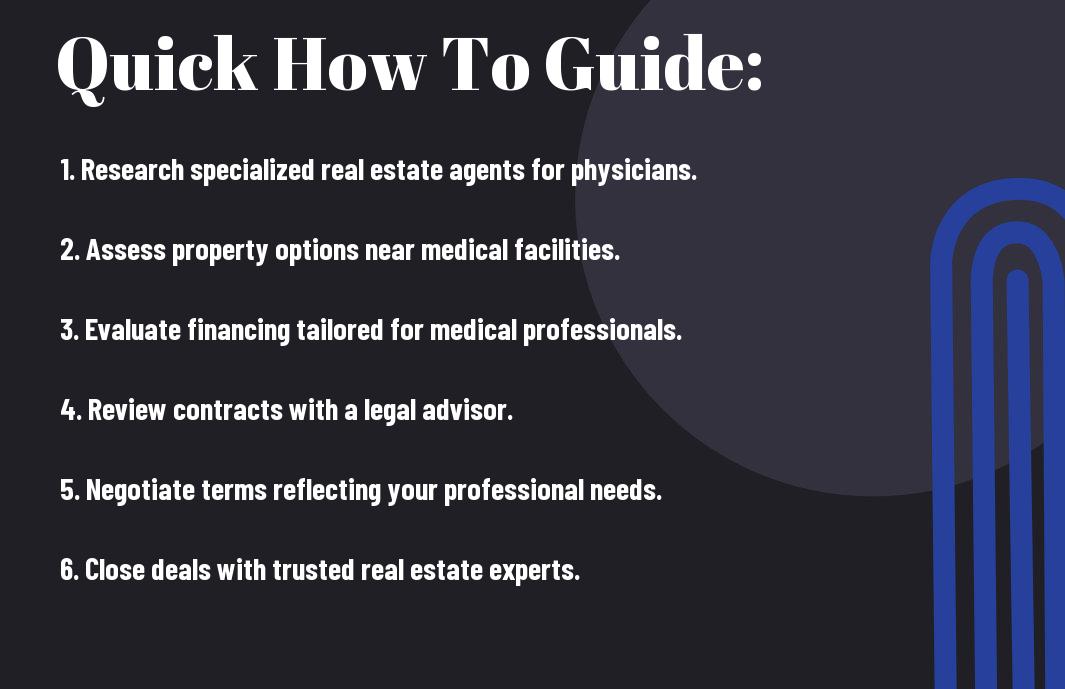You are entering a unique market when it comes to buying and selling property as a physician. Understanding the nuances of physician real estate services can empower you to make informed decisions and navigate the complexities of transactions with ease. In this guide, you will learn effective strategies and insights to approach your real estate endeavors confidently, whether you’re looking for the perfect practice location or planning to sell your existing property. Let’s explore how to achieve your goals in this specialized market.

Understanding Physician Real Estate Services
As a physician, navigating the complexities of real estate is important to ensure that your practice thrives. Understanding the unique requirements of healthcare real estate can empower you to make informed decisions, whether you are buying, selling, or leasing property. Engaging with specialized real estate services can enhance your ability to find optimal locations for your practice, ensuring both financial stability and patient accessibility.
Importance of Real Estate in Healthcare
On your journey as a healthcare provider, the significance of strategic real estate decisions cannot be overstated. The location and quality of your practice’s physical space directly influence patient satisfaction and operational efficiency. By securing the right property, you not only enhance the patient experience but also set the stage for your long-term success in the healthcare industry.
Key Components of Real Estate Services for Physicians
Services tailored for physicians in real estate encompass a range of factors designed to fulfill your specific needs. These include location analysis, financing options, lease negotiations, and property appraisal. By working with professionals who understand the healthcare landscape, you can unlock opportunities that lead to more favorable outcomes for your practice.
With a focus on these key components, dedicated real estate services for physicians can guide you through market complexities. You’ll benefit from tailored strategies that consider your unique requirements as a healthcare provider. From identifying ideal locations to negotiating favorable terms, these services ensure your real estate decisions align with your practice goals, ultimately contributing to your success and the well-being of your patients.

How to Buy Physician Real Estate
The process of buying physician real estate involves multiple steps, tailored to meet your specific practice needs. You should start by identifying your requirements, from location to property size, and consider the potential for future growth. Collaborating with professionals who understand the unique landscape of medical facilities will empower you to make informed decisions and navigate any challenges that may arise during the purchasing process.
Steps to Assess Property Needs
Assuming you have identified your medical practice goals, the next step is to evaluate how the physical space will support these objectives. Consider factors such as accessibility for patients, proximity to hospitals, and the need for specialized facilities. Create a checklist of must-have features and prioritize them to streamline your search, ensuring that the property you choose aligns with your vision for your practice.
Financing Options for Physician Purchases
Now you may wonder about the best ways to finance your property purchase. Various options cater specifically to physicians, including traditional bank loans, SBA loans, or private financing, each offering unique benefits depending on your situation. Understanding these options will help you choose the most suitable path for your financial health and practice needs.
Financing your physician real estate purchase involves evaluating several tailored options. Traditional mortgages may be available, but many physicians also benefit from specialized loans that take into account future income potential and loan repayment timelines. Programs such as the SBA 504 loan offer low down payments and favorable interest rates for medical professionals. Additionally, you may consider establishing a partnership with financial advisors familiar with healthcare financing to ensure you understand all available options and navigate the complexities without stress.
Tips for Selling Physician Real Estate
For successful selling of your physician real estate, consider implementing the following strategies:
- Engage a specialized real estate agent with experience in physician properties.
- Set a realistic and competitive price based on local market analysis.
- Stage the property to highlight its strengths and potential benefits to buyers.
- Be prepared to negotiate and remain flexible with offers.
Thou shall emerge from the selling process with confidence and satisfaction.
Preparing Your Property for Sale
Sale preparation involves enhancing your property’s appeal to potential buyers. Start by decluttering and deep cleaning the premises, as well as making necessary repairs. Consider minor upgrades, like fresh paint or updated fixtures, to increase value. These adjustments can create an inviting atmosphere that resonates with prospective buyers, allowing them to envision their practice thriving in your space.
Effective Marketing Strategies
Real estate marketing plays a vital role in attracting the right buyers. Utilize professional photography and virtual tours to showcase your property’s best features. Listing your property on specialized medical real estate platforms and leveraging social media can expand your reach. Networking with local physician communities can also generate interest among potential buyers.
Tips for effective marketing include crafting compelling property descriptions that highlight unique selling points and providing comprehensive information about the surrounding area, such as nearby amenities and patient demographics. Maintaining clear communication and promptly responding to inquiries can further enhance buyer interest. By presenting your property attractively and strategically, you’ll position it favorably in the market.
Factors to Consider When Buying or Selling
Now that you’re ready to navigate the process of buying or selling physician real estate, consider the following factors:
- Your specific space requirements
- Location and accessibility for patients
- The condition of the property
- Market demand and pricing trends
- Future growth potential and community development
The right preparation and research can enhance your confidence in this endeavor.
Market Trends and Valuation
When assessing the market for physician real estate, it’s important to analyze current trends and how they impact your property’s value. Factors such as local demographics, economic conditions, and competition can significantly influence market dynamics. By staying informed, you can make well-timed decisions that align with market shifts, ensuring you maximize your investment.
Legal and Regulatory Considerations
To successfully navigate the real estate market, you must also be aware of the legal and regulatory landscape affecting physician properties. This includes zoning laws, licensing requirements, and healthcare regulations that may impact your transaction.
Understanding the legal intricacies is important for protecting your interests during a real estate transaction. You should consult with a qualified real estate attorney and familiarize yourself with applicable laws in your area. Issues such as property ownership restrictions, compliance with healthcare regulations, and lease agreements are all factors that can affect the success of your purchase or sale. Ensuring you are well-informed and compliant will help you avoid potential pitfalls and safeguard your investment.
Building a Real Estate Team
Your success in real estate transactions hinges on the strength of your team. As a physician, you will benefit from collaborating with professionals who understand the unique demands of your practice. A well-rounded team will guide you through the complexities of buying and selling property, ensuring you make informed decisions every step of the way.
Essential Professionals to Engage
Real estate transactions require a diverse group of professionals. Engage a knowledgeable real estate agent, a reputable lender, an attorney well-versed in real estate law, and a home inspector. Each expert brings specific skills to the table, ensuring that all aspects of your sale or purchase are covered effectively.
Roles and Responsibilities of Your Team
Essential team members each play specific roles that streamline the buying or selling process. Your real estate agent will guide you through market trends and property valuations, while your lender helps secure financing options tailored to your needs. An attorney ensures that all legal matters are handled correctly, and a home inspector uncovers potential issues with the property.
To maximize the efficiency and effectiveness of your real estate team, establish clear communication and set expectations from the start. Each member should understand their role and how they contribute to your overall goals. Regular check-ins can help keep your team aligned, allowing for timely responses to challenges and questions that may arise during your property transactions. This coordinated approach empowers you to navigate the real estate landscape with confidence and ease.
Common Pitfalls to Avoid
Despite the potential rewards, many physicians encounter pitfalls when engaging in real estate transactions. Failing to conduct thorough market research, underestimating costs, or not understanding zoning laws can lead to costly mistakes. To navigate these challenges effectively, it is crucial to work with experienced real estate professionals who specialize in physician transactions and can guide you through each step of the process.
Mistakes in Buying and Selling
Buying or selling a property without a clear strategy can lead to lost opportunities and financial setbacks. Many physicians investigate transactions hastily, overlooking crucial details such as market trends, property valuation, and financing options. By taking the time to formulate a comprehensive plan and seeking expert advice, you can avoid these common pitfalls and make informed decisions that align with your goals.
Navigating Negotiations
For many, negotiations can be the most daunting aspect of real estate transactions. Approaching these discussions without adequate preparation or knowledge can result in unfavorable agreements. It is vital to understand the market conditions and your own objectives before entering negotiations. You should also be prepared to articulate your position clearly while remaining open to compromise.
The key to successful negotiations lies in preparation and communication. Understanding the motivations of the other party allows you to craft persuasive arguments while setting realistic expectations. Don’t hesitate to ask questions or seek clarification during negotiations, as this not only shows your interest but can also reveal valuable insights. By keeping a calm mind and focusing on your objectives, you can foster a more productive negotiation environment that benefits both parties.
Final Words
With this in mind, understanding physician real estate services empowers you to navigate the complexities of buying and selling property with ease. By familiarizing yourself with the market trends, key practices, and specialized resources tailored for healthcare professionals, you can make informed decisions that align with your unique needs. Whether you are purchasing your first practice location or selling an established property, having the right knowledge and support enables you to manage your real estate transactions with confidence, ensuring a successful outcome for your practice.

